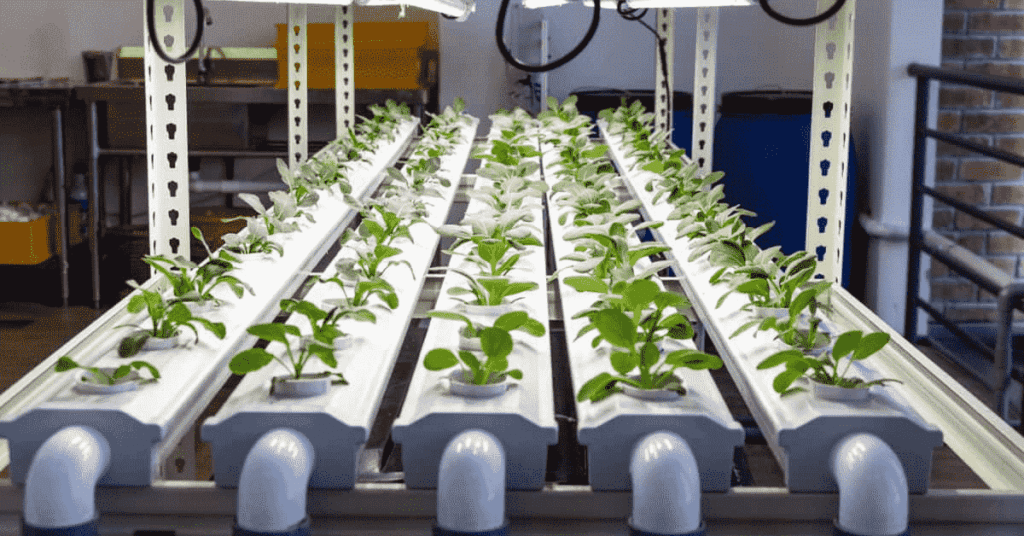Schools and educational institutions play a pivotal role in shaping the minds of future generations. Incorporating hydroponic gardening into the curriculum offers a unique opportunity to foster environmental awareness, scientific exploration, and practical skills. Hydroponic gardening for schools and educational institutions.
Hydroponic farming, a method of growing plants without soil, is gaining popularity worldwide. It is particularly relevant in regions like Rajasthan, where water scarcity is a pressing issue. By adopting hydroponic techniques, schools can not only cultivate fresh produce but also contribute to water conservation efforts.
The Benefits of Hydroponic Gardening in Schools
- Environmental Education: Hydroponic gardening provides a hands-on platform to teach students about sustainable agriculture, water conservation, and the importance of a healthy ecosystem.
- Scientific Learning: Students can explore the principles of botany, chemistry, and physics through hydroponic experiments.
- Nutritional Education: Growing their own food helps students understand the nutritional value of fresh produce and develop healthy eating habits.
- Practical Skills: Students gain valuable skills in plant cultivation, data collection, and problem-solving.
- Community Engagement: Hydroponic gardens can be a focal point for school communities, fostering collaboration and a sense of ownership.
Setting Up a Hydroponic Garden in Schools
Establishing a hydroponic garden in a school requires careful planning and organization.
- Space Allocation: Identify a suitable location for the hydroponic system, considering factors like sunlight, water availability, and classroom proximity.
- Equipment and Supplies: Procure essential equipment such as hydroponic grow systems, nutrient solutions, pH meters, and grow lights.
- Curriculum Integration: Develop lesson plans and activities that align with the school’s curriculum, incorporating science, math, and environmental studies.
- Student Involvement: Encourage student participation in all aspects of the hydroponic garden, from planning to harvesting.
- Maintenance and Monitoring: Establish a routine for monitoring plant growth, water quality, and nutrient levels.
Hydroponic Gardening in Rajasthan: Overcoming Challenges
While hydroponic farming offers immense potential for schools in Rajasthan, it also presents certain challenges due to the region’s arid climate.
- Water Management: Implement efficient water recycling systems and explore the use of rainwater harvesting.
- Climate Control: Create controlled environments using greenhouses or shade nets to regulate temperature and humidity.
- Nutrient Management: Select nutrient solutions specifically designed for arid conditions and monitor nutrient levels closely.
- Energy Efficiency: Utilize solar power to reduce energy consumption for lighting and water pumps.
Inspiring Success Stories
Several schools across India have successfully implemented hydroponic gardening programs. These initiatives have not only enriched the students’ learning experience but also inspired communities to adopt sustainable practices.
Hydroponic gardening offers a transformative approach to education, empowering students to become environmentally conscious and skilled citizens. By embracing this innovative method, schools can create thriving green spaces that nurture both plants and young minds.
Hydroponic farming in Rajasthan has the potential to revolutionize agriculture in the region while providing invaluable learning opportunities for students. By overcoming challenges and leveraging the benefits, schools can establish sustainable and productive hydroponic gardens that serve as models for the community.
Incorporating Hydroponics into the Curriculum
To maximize the educational impact of a hydroponic garden, it’s crucial to integrate it seamlessly into the curriculum. Here’s how:
- Science Curriculum: Explore topics like photosynthesis, plant physiology, nutrient uptake, and the scientific method through hands-on experiments.
- Mathematics: Calculate nutrient ratios, measure plant growth, analyze data, and create graphs.
- English Language Arts: Write reports, create presentations, and develop persuasive arguments about the benefits of hydroponic gardening.
- Social Studies: Study local food systems, agriculture, and the impact of climate change.
- Art and Design: Create visually appealing displays for the hydroponic garden, design labels for produce, and develop marketing materials.
- Health and Nutrition: Learn about the importance of healthy eating, food safety, and the nutritional value of hydroponically grown produce.
Building a School Community Around Hydroponics
A hydroponic garden can serve as a catalyst for building a strong school community. Consider these ideas:
- Student-Led Initiatives: Empower students to take ownership of the garden by creating student-led clubs or committees.
- Parent and Community Involvement: Organize workshops, field trips, and volunteer opportunities to engage parents and the community.
- School Cafeteria Partnerships: Collaborate with the school cafeteria to incorporate hydroponically grown produce into the menu.
- Fundraising and Grants: Explore opportunities to fundraise for garden expansion or participate in grant programs to support educational initiatives.


Overcoming Challenges and Ensuring Sustainability
While hydroponic gardening offers numerous benefits, it’s essential to address potential challenges and ensure the long-term sustainability of the project:
- Teacher Training: Provide teachers with adequate training and resources to effectively integrate hydroponics into the curriculum.
- Equipment Maintenance: Establish a maintenance schedule for hydroponic equipment to prevent breakdowns and optimize performance.
- Continuous Learning: Encourage ongoing research and experimentation to stay updated on the latest hydroponic techniques and technologies.
- Data Collection and Analysis: Implement a system for collecting and analyzing data on plant growth, nutrient levels, and environmental factors.
Inspiring Future Generations
By incorporating hydroponic gardening into schools, we are not only teaching students about sustainable agriculture but also cultivating a generation of environmentally conscious and problem-solving individuals. Hydroponic gardens can serve as living laboratories where students can explore the wonders of nature, develop essential life skills, and contribute to a more sustainable future.
